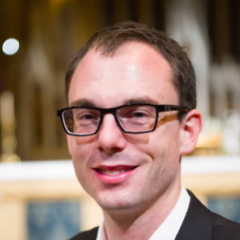The gambling tables and neon lights of Las Vegas might not be the images which immediately enter your head when you think of Verdi’s Rigoletto, but bold art is often created and progressed by the pushing of boundaries and by challenging audiences to reimagine the familiar. The themes present in great works of art are often timeless and as long as the essence of their messages is preserved, great relevance can be found in contemporary settings. This is the case in Michael Mayer’s 2013 production currently being revived at the Metropolitan Opera.
As the curtain rose, the audience is dazzled by a blaze of light from the neon signs, the stage filled with a hive of activity of gambling and debauchery. This forms a perfect backdrop and introduction to the louche lifestyle of the Duke (Stephen Costello), whose womanizing and hedonistic lifestyle leads to his betrayal of Gilda and the opera’s ultimate tragedy. Costello’s performance was particularly strong in this first act. One of today’s brightest tenors, with ringing clarity to his voice, Costello played the Duke with the confidence and arrogance which the character requires. His opening aria “Questo o quella” was full of these attributes. He also showed his tender and passionate qualities in his duet with Gilda where she falls for his "poor student" in Act 1. Their parting was full of passion and impressive in the way he managed the long, high sustained lines. Olga Peretyatko shone as Gilda, particularly bringing out the innocence and naivety in her character through her pure, ringing tone, imbued with a beautiful sweetness.
Her naivety was in stark contrast to the evil of the character of Sparafucile, which was so chillingly brought out by Italian bass Andrea Mastroni, making his Met debut. His performance was one of the vocal highlights of the evening, his booming resonance in the low lying tessitura drawing out the character's darkness. He portrayed the hitman with an almost perverse and unrepentant pleasure – this pure evil contrasted with the innocence of Gilda heightening the sense of impending tragedy. Another strong debut was given by Nelson Martínez who played the part of Monterone, in this production portrayed as a sheikh. He delivered the curse, which so haunts Rigoletto to the opera's tragic end, with authority. Another debutant, Pier Giorgio Morandi, presided over a strong orchestral performance. Despite some rather suspect ensemble moments, the orchestra played with energy and tenderness in equal measure. Morandi guided with sensitivity, always allowing space for the singers and never allowing lines to feel rushed.
The title role was given a strong performance by Serbian baritone Željko Lučić, returning to the role from this production's first outing. His was a secure vocal rendition, played with authority. Lučić brought out the emotional fragility of his character; his love, fear and protection for Gilda were palpable. Another of the evening’s highlights was his final duet with Gilda as she is dying, where the full extent of the tragedy and fulfillment of the prophecy is finally played out. While he was slightly vocally restrained earlier on, it seemed that Lučić really took this moment to show us the true extent of his musical powers, unleashing an extremely impressive final top A.
The set in Act 3 really took the debauchery inherent in this production further. As the curtain rises, the Duke is being entertained by a near-naked woman, performing a sensual dance for his pleasure. This is followed by the entrance of Sparafucile’s sister, Maddalena, played by Oksana Volkova, who played the role with flirtatiousness, performing a pole dance and singing her role with a delightful richness of tone. She was also highly pleasing in the quartet with the Duke, Gilda and Rigoletto, the aural highlight of the evening.
As the opera reaches its inevitable conclusion with Gilda's sacrifice, her body is bundled into the back of a car which had menacingly been sitting at the side of the stage for the whole of the final act, from where Rigoletto finally discovers the horrifying truth. In a production which exuded indulgence, hedonism and sensuality, the final dying words of Gilda finally move the focus of the opera from the earthly to the heavenly; from the sensual to the spiritual, her final words preaching forgiveness and promising prayers from Heaven.




